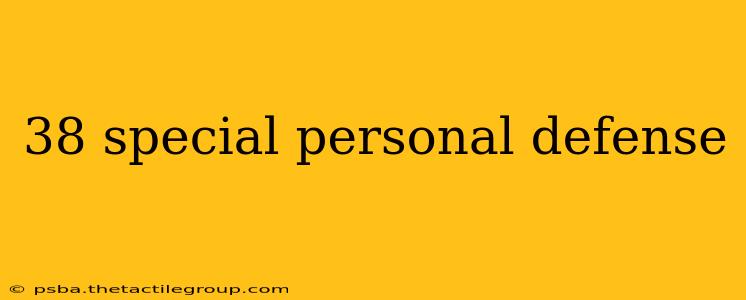The .38 Special remains a popular cartridge for personal defense, despite the introduction of newer, more powerful rounds. Its widespread availability, manageable recoil, and proven effectiveness contribute to its enduring appeal. However, choosing the right firearm and understanding its limitations are crucial for effective self-defense. This guide delves into the .38 Special's strengths and weaknesses, offering a balanced perspective for those considering it for personal protection.
The .38 Special: History and Ballistics
Developed in 1898, the .38 Special has a rich history in law enforcement and civilian self-defense. Its relatively low recoil makes it manageable for a wide range of shooters, including those with less experience. The cartridge's versatility is another key factor; it's available in a wide variety of bullet weights and types, from full metal jacket (FMJ) rounds to hollow points (HP) designed for expansion and increased stopping power.
Understanding the ballistics is critical. While not as powerful as some modern cartridges, the .38 Special delivers sufficient energy at typical self-defense ranges (typically under 25 yards). The choice of ammunition significantly impacts its effectiveness. Hollow point ammunition is generally preferred for personal defense due to its increased expansion and energy transfer upon impact, leading to greater stopping power. FMJ rounds, while more readily available and less expensive, tend to penetrate more deeply without expanding, potentially causing unintended harm to bystanders.
Choosing a .38 Special Revolver for Self-Defense
Several factors should be considered when selecting a .38 Special revolver for self-defense:
Revolver Type:
- Snub-nose revolvers: These compact revolvers are highly concealable, making them ideal for everyday carry. However, their short barrels result in slightly lower velocity and accuracy compared to longer-barreled models.
- Longer-barreled revolvers: Offer improved accuracy and velocity, but are less concealable.
Action Type:
- Double-action: Allows for both single-action (cocking the hammer before each shot) and double-action (pulling the trigger directly to cock and fire) operation. This offers flexibility in shooting style.
- Single-action: Requires manual cocking of the hammer before each shot. This offers a smoother trigger pull but may be slower in a self-defense situation.
Features:
- Sight configuration: Proper sighting is crucial for accuracy. Choose a revolver with sights that you can easily acquire and use.
- Grip size and type: Ensure a comfortable and secure grip for reliable shooting.
- Weight: A heavier revolver will generally have less recoil, improving control and accuracy.
Ammunition Selection: Critical Considerations
The choice of ammunition is arguably the most crucial aspect of self-defense with a .38 Special. While many options exist, hollow-point ammunition is generally recommended for its ability to expand and transfer more energy upon impact, maximizing its stopping power. Look for reputable manufacturers and consider the specific characteristics of different rounds, such as expansion performance and penetration depth. Consult with experts or experienced shooters to make an informed decision.
Training and Practice: Essential for Effective Self-Defense
Owning a firearm is only half the battle. Regular and consistent training is crucial for safe and effective use in a self-defense scenario. This includes proper grip, stance, sight alignment, trigger control, and malfunction drills. Consider taking a professional firearms training course to build proficiency and confidence. Dry-fire practice (practicing trigger pull and aiming without live ammunition) can also significantly improve shooting skills.
Legal Considerations: Know Your Local Laws
Before purchasing any firearm, research and understand the laws and regulations governing firearm ownership and use in your area. These laws vary significantly by jurisdiction and include requirements for licensing, registration, and carrying concealed weapons.
Conclusion: .38 Special – A Viable Option, But Not Without Considerations
The .38 Special remains a viable option for personal defense, offering a balance of manageable recoil, widespread availability, and proven effectiveness. However, careful consideration of ammunition selection, firearm choice, and rigorous training is crucial to ensure its safe and effective use. Remember, responsible gun ownership includes understanding your weapon's capabilities and limitations, and committing to regular practice and training. Always prioritize safety and legality.

